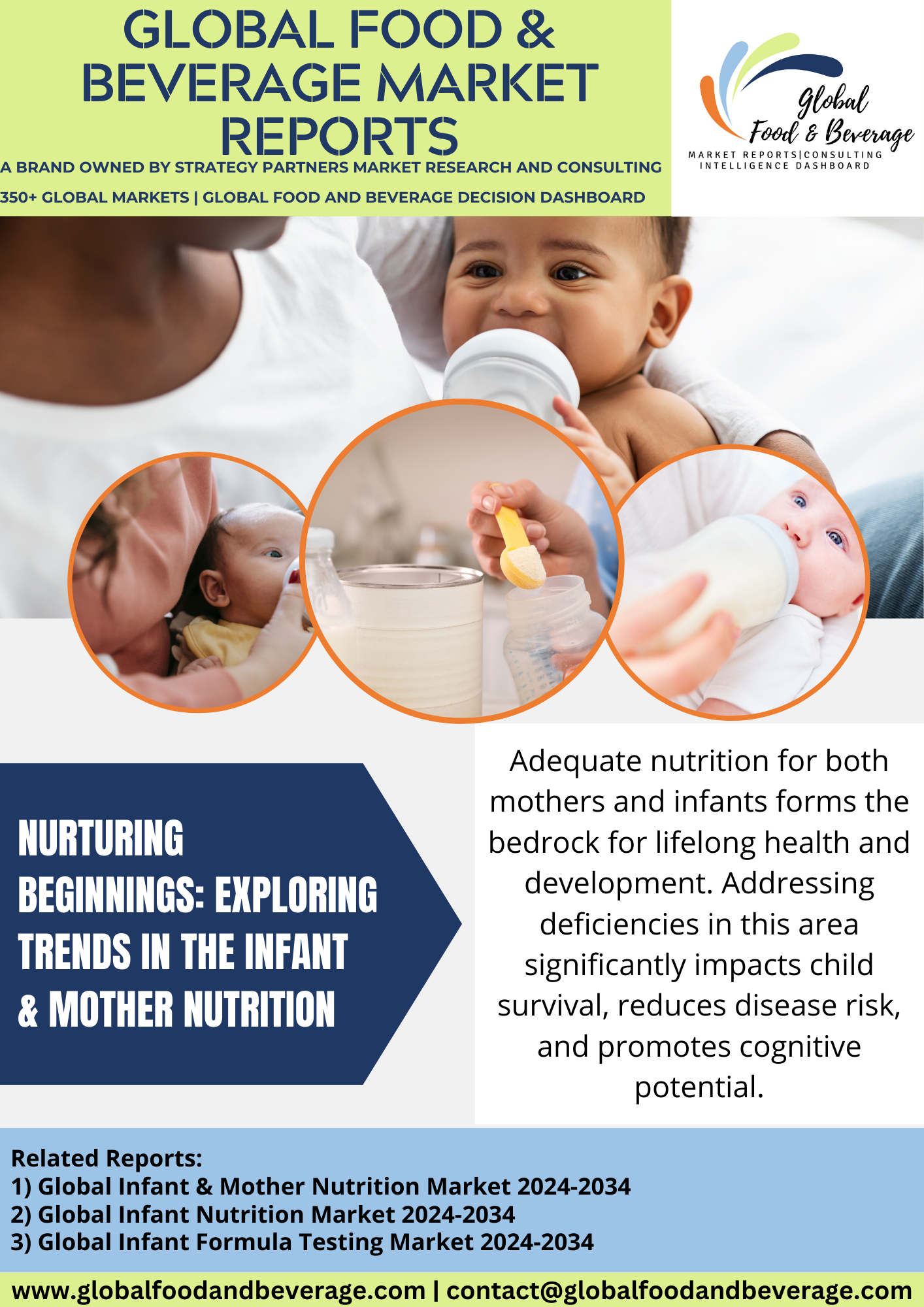Nurturing Beginnings: Exploring Trends in the Infant & Mother Nutrition Market
Infant and mother nutrition are intrinsically linked, playing a pivotal role in ensuring the health and well-being of both the mother and her newborn. During pregnancy, the mother’s nutritional intake significantly influences the development and growth of the fetus. Adequate intake of essential nutrients, including folic acid, iron, calcium, and various vitamins, is crucial for the proper formation of the baby’s organs and tissues. Focusing on a balanced diet, prenatal vitamins, and regular healthcare check-ups is essential to support a healthy pregnancy.

After birth, breastfeeding becomes a cornerstone of infant nutrition. Breast milk is a complete and natural source of nutrients, providing the ideal balance of proteins, fats, vitamins, and antibodies necessary for the infant’s growth and immune system development. The act of breastfeeding also establishes a unique bond between the mother and her baby, fostering emotional and physical well-being.
For mothers who cannot breastfeed, or when it is not sufficient, specially formulated infant formulas provide a viable alternative. These formulas are designed to mimic the nutritional composition of breast milk, ensuring that infants receive the essential nutrients crucial for their early development. However, it is crucial to consult healthcare professionals to choose the most suitable formula and feeding method for the infant’s specific needs.
As infants transition to solid foods, the introduction of a diverse and nutritious diet becomes paramount. Providing a variety of fruits, vegetables, whole grains, and proteins helps establish healthy eating habits early in life. It is essential to pay attention to potential allergens and introduce them gradually while monitoring the infant’s response.
The interconnection between infant and mother nutrition emphasizes the need for ongoing maternal health postpartum. Mothers require adequate nutrition and care to recover from childbirth, produce breast milk, and meet the demands of caring for a newborn. Prioritizing maternal nutrition not only supports the mother’s well-being but also contributes to her ability to provide optimal care for her infant.
ADVANCEMENTS
Infant and mother nutrition underscore the importance of early life nutrition for optimal health and development. One significant breakthrough is the development of advanced infant formulas that aim to mimic the nutritional composition of breast milk more closely. Innovations in ingredient selection, such as the inclusion of prebiotics, probiotics, and human milk oligosaccharides, contribute to improved digestive health and immune support for formula-fed infants.
Research on the role of maternal nutrition during pregnancy and lactation has led to personalized approaches to support both maternal and infant well-being. Tailored nutritional interventions consider factors such as maternal age, health status, and dietary preferences to provide optimal nutrient levels for fetal development and postnatal care.
Advancements in functional ingredients, including omega-3 fatty acids, choline, and micronutrients, are incorporated into maternal and infant nutrition products to address specific health outcomes. These formulations aim to support brain development, immune function, and overall growth during critical periods of early life.
The exploration of the microbiome’s role in infant and maternal health has led to the development of synbiotics—combinations of prebiotics and probiotics—in nutritional products. These formulations aim to promote a balanced and healthy gut microbiota, which is increasingly recognized for its influence on immune function and metabolic health.
In the area of fortified foods and supplements, advancements in delivery systems ensure the bioavailability of nutrients. Nanotechnology and microencapsulation techniques help protect sensitive nutrients, allowing for their controlled release and absorption in both maternal and infant nutrition products.
Digital health tools and applications are increasingly utilized to provide personalized nutritional guidance for mothers and infants. Mobile apps and online platforms offer access to evidence-based information, dietary tracking, and support systems, enhancing maternal and infant nutrition education and adherence.
CHALLENGES
Infant and mother nutrition face challenges across various stages, from prenatal care to postnatal feeding. One significant challenge is ensuring proper maternal nutrition during pregnancy. Inadequate access to balanced diets and essential nutrients for expectant mothers can lead to adverse effects on fetal development and maternal health. Promoting education and improving access to nutritional resources for pregnant women is crucial to address this challenge.
Breastfeeding practices encounter challenges, including societal norms, workplace support, and maternal health. Encouraging breastfeeding as the primary source of infant nutrition requires overcoming cultural barriers, providing lactation support in workplaces, and addressing health concerns that may limit breastfeeding duration.
Introducing complementary foods to infants poses challenges related to the quality and diversity of diets. Ensuring that complementary foods meet the nutritional needs of infants, particularly in low-resource settings, demands education on proper feeding practices, food safety, and affordable access to nutrient-rich foods.
Market competition in the infant nutrition industry is intense, with various formula products available. Successfully differentiating products, addressing diverse nutritional needs, and staying competitive demand continuous innovation in formulations, packaging, and marketing strategies.
Regulatory compliance is a complex challenge in infant and mother nutrition, particularly concerning health claims, labeling requirements, and safety standards. Adhering to diverse regulations across regions or countries requires continuous diligence to ensure transparency and compliance with global standards.
Addressing malnutrition and stunting in vulnerable populations, especially in developing countries, is an ongoing challenge. Implementing effective public health interventions, improving access to fortified foods, and promoting community-based nutrition education are essential components of addressing these challenges.
CONCLUSION
Infant and mother nutrition stand at the heart of early development, embodying the profound impact of nourishment on lifelong health. From prenatal care to breastfeeding and infant formula innovations, this dynamic field merges scientific advancements with maternal instinct. As global awareness of the critical first 1,000 days grows, the industry’s commitment to providing essential nutrients aligns with a vision of healthier generations. The future holds a promising blend of personalized nutrition, sustainable sourcing, and continued research, fostering a nourishing environment where both mothers and infants thrive. In this evolving landscape, the synergy of science and maternal care shapes the foundation of a healthier world.
